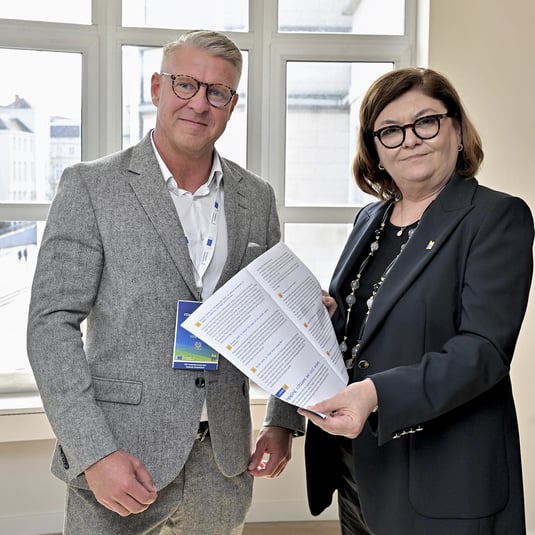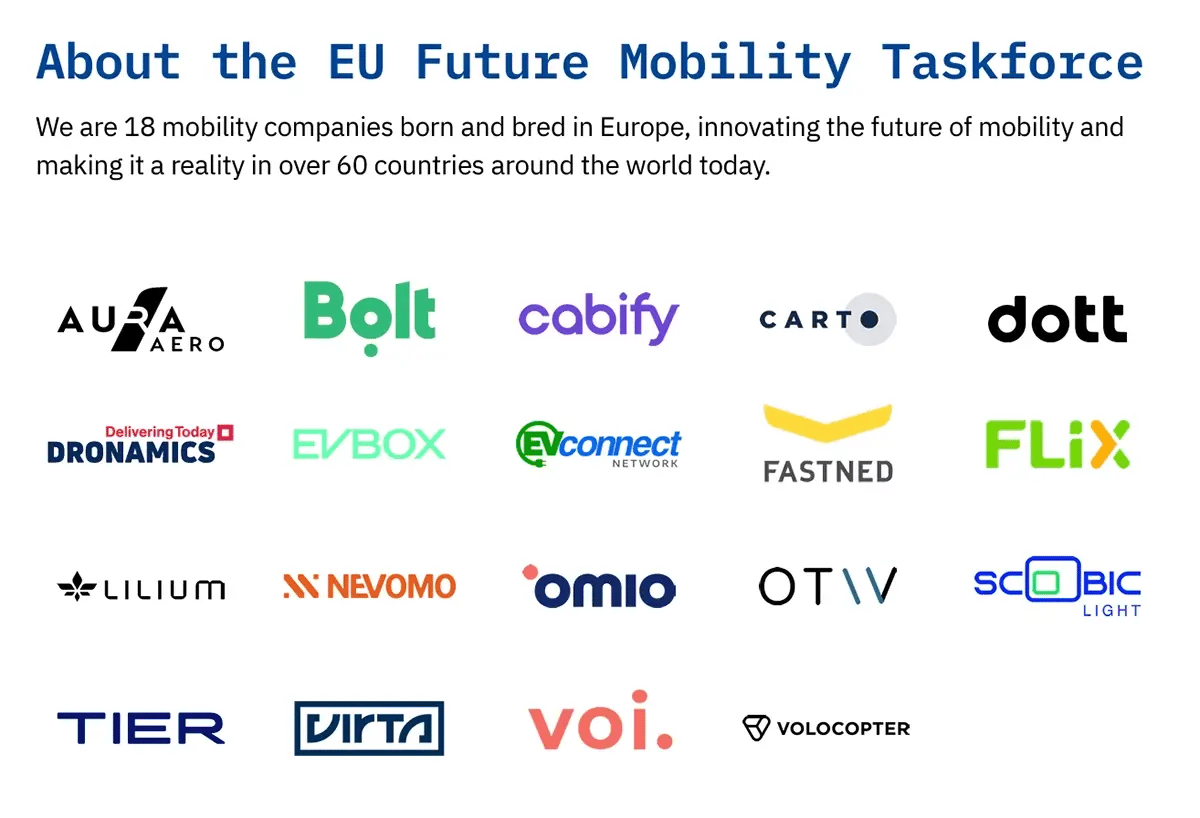Virta and 18 “Mobility Unicorns” to EU Commissioner Válean: “Commercial innovations to be prioritised in EU transport policy”
On Thursday, April 3rd, 2024, 18 leading European mobility unicorns and scale-ups delivered a "call for action" document to the European Commissioner for Transport, Adina Válean, in Brussels. Elias Pöyry, co-founder of Virta, presented the document.
The call for action emphasizes the importance of a commercial innovation-driven transport policy and proposes the establishment of a high-level transport coordinator within the European Commission.
 Photo 1: Elias Pöyry and Adina Válean
Photo 1: Elias Pöyry and Adina Válean
Global emission reduction targets necessitate the electrification and digitalization of transportation. In the realm of digital services, global scale prevails. The EU has an opportunity to foster the growth of new European innovative companies by enforcing large, unified home markets and leveraging new financing tools directed towards future commercial growth innovations.
The EU Future Mobility Task Force, comprised of the 18 leading European mobility unicorns and scale-ups, advocates for a shift in commission transport policy towards open, market-driven, and Europe-wide policies. These policies would enable a true single market for new innovative transport modes, technologies, and mobility services.
Currently, mobility and transport services are heavily regulated around traditional technologies and service providers, with regulations varying between EU member states. Furthermore, a significant portion of services and investments are organized by the public sector at local and member state levels.
Mr. Elias Pöyry states, "We must open Europe to market-driven new mobility solutions that not only fill gaps but also openly compete with current technologies and services in an open single market. European citizens seek to adopt new sustainable, cost-efficient, and user-friendly technologies, benefiting from digitalization, new services, and competition. The new Alternative Fuels Infrastructure Regulation (AFIR) sets an example for European-level regulation by establishing a level playing field for all players."
As preparations for the new commission program are underway ahead of the European elections in June 2024, the Finnish government has published a "non-paper" titled "From Regulatory Powerhouse to a Superpower of Digital Growth," aligning with the views of mobility unicorns.
Additionally, the EU is preparing a new major funding initiative as a continuation of the EU Recovery Fund. Public funding is expected to play an increasingly significant role in both innovations and investments in the EU in the coming years. It is crucial that funding mechanisms become simpler, faster, and more accessible to new disruptive businesses and technologies.
Mr. Pöyry notes, "Traditionally, startups are funded through innovation instruments, and incumbents through commercial and infrastructural funding subsidies. A better balance is needed to allow commercial scalability for newcomers."
Recognising the convergence of the transport system with electric vehicles and energy markets, Mr. Pöyry acknowledges the necessity of engaging EU citizens and instilling trust in the new transport system based on green electricity instead of fossil fuels.
The 18 leading European mobility unicorns and scale-ups hope that this document will assist the European Parliament and the new commission in addressing the challenges of regulation, market access, and access to finance.
The paper calls for:
- Better regulation and market access, allowing new innovations to enter the market earlier and removing barriers caused by local and national regulated markets, as well as private companies' access to protected markets.
- Access to finance for new innovative companies to enter and scale operations in the single market, fostering European competitiveness through innovation and commercial scalability.
- Engaging citizens and civil society, particularly by allowing consumers to be treated as customers and enabling them to directly benefit from digitally driven services.
As a concrete suggestion, the group proposes establishing a high-level transport coordinator within the European Commission, with a focus on aligning public service better with new technologies, innovation, and commercial services in transport policy-making.
The EU Future Mobility Task Force comprises 18 European companies across shared mobility, EV charging, maglev, rail, coach, cargo, and air mobility sectors, focusing on transport innovation and deep-tech. These companies share the common goal of introducing new solutions to meet increased consumer demand and make mobility more sustainable, affordable, and connected.

New content alerts
You may also like
These related stories
/closeup%20to%20a%20white%20electric%20vehicle%20with%20plugged%20cable.webp?width=1120&height=630&name=closeup%20to%20a%20white%20electric%20vehicle%20with%20plugged%20cable.webp)
Elias Pöyry to chair EURELECTRIC’s EV working group
/easy-charging-phone-in-hand-in-front-of-white-car.webp?width=1920&height=1080&name=easy-charging-phone-in-hand-in-front-of-white-car.webp)
easyGroup company easyCharging chooses Virta to build Europe-wide EV charging services
/energy-data-access-conference-2019.webp?width=1920&height=1080&name=energy-data-access-conference-2019.webp)
The peak power of aggregated EVs equals a nuclear reactor
/ft1000-2023-logo-on-blue.webp?width=1152&height=648&name=ft1000-2023-logo-on-blue.webp)